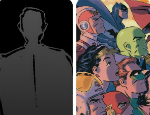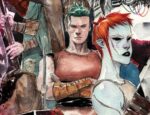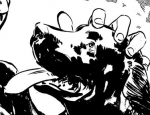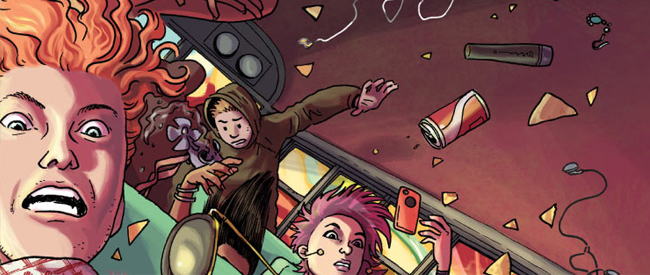
In a true balls-to-the-walls thrill ride, Alex de Campi and Carla Speed McNeil explore the modern ties that bind in this visceral, disturbing chiller that begs the question: what would you do?
In a world where tourists have become prime targets for terrorism and violent crime, w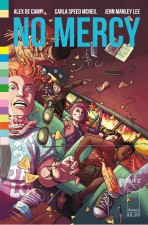 here planes seem to be falling from the sky with startling frequency, and connectivity to the Internet can save or doom lives depending on how many bars we receive, a comic exploring the pitfalls of travel and our response to adversity would seem like a timely arrival, indeed.
here planes seem to be falling from the sky with startling frequency, and connectivity to the Internet can save or doom lives depending on how many bars we receive, a comic exploring the pitfalls of travel and our response to adversity would seem like a timely arrival, indeed.
This week, Alex de Campi and Carla Speed McNeil tap into modern travel fears in an increasingly unstable world in their new creator-owned series from Image Comics. A story about survival and death in the Mexican outback, No Mercy follows a group of American students as they embark on a trip south of the border to build much-needed schools for those less fortunate than themselves.
De Campi and McNeil build a wonderfully diverse, spot-on ensemble cast, who conceal hidden depths and secrets that belie their typically millennial motivations. It isn’t long before the group plunges quite literally over the cliff of the world they thought they knew into danger and the unknown. With little hope of rescue and rapidly diminishing supplies, each student rises or falls to the extreme challenges thrown at them, according to their varied reactions.
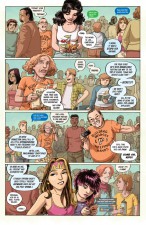 Even family ties break down in the face of starvation, lack of authority, and – most pointedly – the absence of any form of connectivity. As tensions mount and battle lines are drawn among the survivors, it becomes increasingly evident that the most dangerous challenge these kids face is their inability to work together.
Even family ties break down in the face of starvation, lack of authority, and – most pointedly – the absence of any form of connectivity. As tensions mount and battle lines are drawn among the survivors, it becomes increasingly evident that the most dangerous challenge these kids face is their inability to work together.
Unable to detach themselves from the first-world amenities and constant connection to the outside world that technology affords them, physical, cultural, and emotional shock set in, impeding their efforts to extricate themselves from their dire predicament. Although a handful of students react to their extreme situation with strength and foresight, most degenerate into mewling pups so far out of their comfort zones that it’s almost a foregone conclusion they’ll never find their ways back.
As a seasoned world traveler, de Campi brings a wealth of experience and knowledge to this harrowing journey into the wilds of rural Mexico. She ably exploits her ensemble cast’s intense culture shock and first-world, coddled origins with insight and giddy relish.
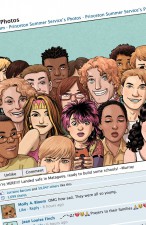 Also serving as the letterer, de Campi’s use of recognizable icons and emoji (emoticons) adds another layer to the separation anxiety felt by most members of the travel group. Not only does her unique lettering style underscore the students’ reliance on technology to navigate their way through life, it showcases just how insidious and internalized our new language has become in the digital age.
Also serving as the letterer, de Campi’s use of recognizable icons and emoji (emoticons) adds another layer to the separation anxiety felt by most members of the travel group. Not only does her unique lettering style underscore the students’ reliance on technology to navigate their way through life, it showcases just how insidious and internalized our new language has become in the digital age.
Using these visual cues, de Campi manages to convey complex emotions and interpersonal information in a clear, concise fashion, while minimizing or streamlining exposition. She pushes the boundaries of modern graphic storytelling, appealing to her millennial audience by speaking the language they use and love the most.
Artistic collaborator McNeil also layers her visuals with richly detailed backdrops of arid landscapes that somehow seem threateningly intimate, even as they take the breath away with their sheer scope and majesty. In a story where “setting as character” takes on a whole new sinister light, McNeil’s lush rendering camouflages the inherent danger surrounding the students with scenes of sublime beauty (backed up admirably by Jenn Manley Lee’s colors).
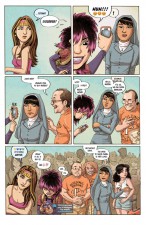 The students are an eclectic bunch and McNeil’s designs highlight their diverse backgrounds. Each character stands out with a distinctive appearance and even body language. McNeil imbues each face with lively emotion, highlighting the subtle psychological complexities of de Campi’s script. In fact, the creative synergy evident in the collaboration gives the impression that writer and artist are one and the same – a testament to the high-level craft and strength of vision infused in No Mercy.
The students are an eclectic bunch and McNeil’s designs highlight their diverse backgrounds. Each character stands out with a distinctive appearance and even body language. McNeil imbues each face with lively emotion, highlighting the subtle psychological complexities of de Campi’s script. In fact, the creative synergy evident in the collaboration gives the impression that writer and artist are one and the same – a testament to the high-level craft and strength of vision infused in No Mercy.
Visceral, breathtaking, and above all insightful, No Mercy is a prime example of how the digital age has impacted our perceptions of travel and communication on a fundamental level. De Campi and McNeil remind us that while it’s easy to retreat to the relative safety of our smartphone buffers, it’s our very real physical and emotional connections – the precious moments we dedicate to true “face time” – that will save us in the end.
Alex De Campi (W), Carla Speed McNeil (A), Jenn Manley Lee (C) • Image Comics, $3.99, April 1, 2015






